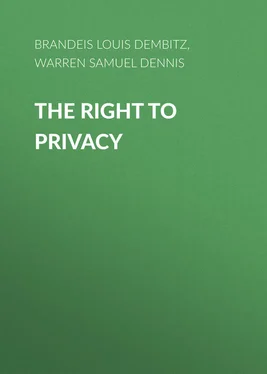Louis Brandeis - The Right to Privacy
Здесь есть возможность читать онлайн «Louis Brandeis - The Right to Privacy» — ознакомительный отрывок электронной книги совершенно бесплатно, а после прочтения отрывка купить полную версию. В некоторых случаях можно слушать аудио, скачать через торрент в формате fb2 и присутствует краткое содержание. Жанр: foreign_antique, foreign_prose, на английском языке. Описание произведения, (предисловие) а так же отзывы посетителей доступны на портале библиотеки ЛибКат.
- Название:The Right to Privacy
- Автор:
- Жанр:
- Год:неизвестен
- ISBN:нет данных
- Рейтинг книги:5 / 5. Голосов: 1
-
Избранное:Добавить в избранное
- Отзывы:
-
Ваша оценка:
- 100
- 1
- 2
- 3
- 4
- 5
The Right to Privacy: краткое содержание, описание и аннотация
Предлагаем к чтению аннотацию, описание, краткое содержание или предисловие (зависит от того, что написал сам автор книги «The Right to Privacy»). Если вы не нашли необходимую информацию о книге — напишите в комментариях, мы постараемся отыскать её.
The Right to Privacy — читать онлайн ознакомительный отрывок
Ниже представлен текст книги, разбитый по страницам. Система сохранения места последней прочитанной страницы, позволяет с удобством читать онлайн бесплатно книгу «The Right to Privacy», без необходимости каждый раз заново искать на чём Вы остановились. Поставьте закладку, и сможете в любой момент перейти на страницу, на которой закончили чтение.
Интервал:
Закладка:
These considerations lead to the conclusion that the protection afforded to thoughts, sentiments, and emotions, expressed through the medium of writing or of the arts, so far as it consists in preventing publication, is merely an instance of the enforcement of the more general right of the individual to be let alone. It is like the right not to be assaulted or beaten, the right not to be imprisoned, the right not to be maliciously prosecuted, the right not to be defamed. In each of these rights, as indeed in all other rights recognized by the law, there inheres the quality of being owned or possessed – and (as that is the distinguishing attribute of property) there may be some propriety in speaking of those rights as property. But, obviously, they bear little resemblance to what is ordinarily comprehended under that term. The principle which protects personal writings and all other personal productions, not against theft and physical appropriation, but against publication in any form, is in reality not the principle of private property, but that of an inviolate personality. 32
Конец ознакомительного фрагмента.
Текст предоставлен ООО «ЛитРес».
Прочитайте эту книгу целиком, купив полную легальную версию на ЛитРес.
Безопасно оплатить книгу можно банковской картой Visa, MasterCard, Maestro, со счета мобильного телефона, с платежного терминала, в салоне МТС или Связной, через PayPal, WebMoney, Яндекс.Деньги, QIWI Кошелек, бонусными картами или другим удобным Вам способом.
1
Year Book, Lib. Ass., folio 99, pl. 60 (1348 or 1349), appears to be the first reported case where damages were recovered for a civil assault.
2
These nuisances are technically injuries to property; but the recognition of the right to have property free from interference by such nuisances involves also a recognition of the value of human sensations.
3
Year Book, Lib. Ass., folio 177, p. 19 (1356), (2 Finl. Reeves Eng. Law, 395) seems to be the earliest reported case of an action for slander.
4
Winsmore v. Greenbank, Willes, 577 (1745).
5
Loss of service is the gist of the action; but it has been said that "we are not aware of any reported case brought by a parent where the value of such services was held to be the measure of damages." Cassoday, J., in Lavery v. Crooke, 52 Wls. 612, 623 (1881). First the fiction of constructive service was invented; Martin v. Payne, 9 John. 387 (1812). Then the feelings of the parent, the dishonor to himself and his family, were accepted as the most important element of damage. Bedford v. McKowl, 3 Esp. 119 (1800); Andrews v. Askey, 8 C. & P. 7 (1837); Phillips v. Hoyle, 4 Gray, 568 (1855); Phelin v. Kenderdine, 20 Pa. St. 354 (1853). The allowance of these damages would seem to be a recognition that the invasion upon the honor of the family is an injury to the parent's person, for ordinarily mere injury to parental feelings is not an element of damage, e. g. , the suffering of the parent in case of physical injury to the child. Flemington v. Smithers, 2 C. & P. 292 (1827); Black v. Carrolton R. R. Co., 10 La. Ann. 33 (1855); Covington Street Ry. Co. v. Packer, 9 Bush, 455 (1872).
6
"The notion of Mr. Justice Yates that nothing is property which cannot be earmarked and recovered in detinue or trover, may be true in an early stage of society, when property is in its simple form, and the remedies for violation of it also simple, but is not true in a more civilized state, when the relations of life and the interests arising therefrom are complicated." Erie, J., in Jefferys v. Boosey, 4 H. L. C. 815, 869 (1854).
7
Copyright appears to have been first recognized as a species of private property in England in 1558. Drone on Copyright, 54, 61.
8
Gibblett v. Read, 9 Mod. 459 (1743), is probably the first recognition of goodwill as property.
9
Hogg v. Kirby, 8 Ves. 215 (1803). As late as 1742 Lord Hardwicke refused to treat a trade-mark as property for infringement upon which an injunction could be granted. Blanchard v. Hill, 2 Atk. 484.
10
Cooley on Torts, 2d ed., p. 29.
11
8 Amer. Law Reg. N. S. 1 (1869); 12 Wash. Law Rep. 353 (1884); 24 Sol. J. & Rep. 4 (1879).
12
Scribner's Magazine, July, 1890. "The Rights of the Citizen: To his Reputation," by E. L. Godkin, Esq., pp. 65, 67.
13
Marion Manola v. Stevens & Myers, N. Y. Supreme Court, "New York Times" of June 15, 18, 21, 1890. There the complainant alleged that while she was playing in the Broadway Theatre, in a rôle which required her appearance in tights, she was, by means of a flash light, photographed surreptitiously and without her consent, from one of the boxes by defendant Stevens, the manager of the "Castle in the Air" company, and defendant Myers, a photographer, and prayed that the defendants might be restrained from making use of the photograph taken. A preliminary injunction issued ex parte , and a time was set for argument of the motion that the injunction should be made permanent, but no one then appeared in opposition.
14
Though the legal value of "feelings" is now generally recognized, distinctions have been drawn between the several classes of cases in which compensation may or may not be recovered. Thus, the fright occasioned by an assault constitutes a cause of action, but fright occasioned by negligence does not. So fright coupled with bodily injury affords a foundation for enhanced damages; but, ordinarily, fright unattended by bodily injury cannot be relied upon as an element of damages, even where a valid cause of action exists, as in trespass quare clausum fregit . Wyman v. Leavitt, 71 Me. 227; Canning v. Williamstown, 1 Cush. 451. The allowance of damages for injury to the parents' feelings, in case of seduction, abduction of a child (Stowe v. Heywood, 7 All. 118), or removal of the corpse of child from a burial-ground (Meagher v. Driscoll, 99 Mass. 281), are said to be exceptions to a general rule. On the other hand, injury to feelings is a recognized element of damages in actions of slander and libel, and of malicious prosecution. These distinctions between the cases, where injury to feelings does and where it does not constitute a cause of action or legal element of damages, are not logical, but doubtless serve well as practical rules. It will, it is believed, be found, upon examination of the authorities, that wherever substantial mental suffering would be the natural and probable result of the act, there compensation for injury to feelings has been allowed, and that where no mental suffering would ordinarily result, or if resulting, would naturally be but trifling, and, being unaccompanied by visible signs of injury, would afford a wide scope for imaginative ills, there damages have been disallowed. The decisions on this subject illustrate well the subjection in our law of logic to common-sense.
15
Интервал:
Закладка:
Похожие книги на «The Right to Privacy»
Представляем Вашему вниманию похожие книги на «The Right to Privacy» списком для выбора. Мы отобрали схожую по названию и смыслу литературу в надежде предоставить читателям больше вариантов отыскать новые, интересные, ещё непрочитанные произведения.
Обсуждение, отзывы о книге «The Right to Privacy» и просто собственные мнения читателей. Оставьте ваши комментарии, напишите, что Вы думаете о произведении, его смысле или главных героях. Укажите что конкретно понравилось, а что нет, и почему Вы так считаете.












